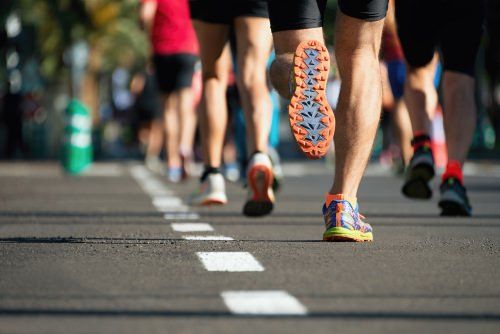How to train for a half marathon
Before you take up your position on the start line on race day, there are weeks of training that need to be done leading up to the race. Check out our tips on how to train for a half marathon successfully and make sure that you’re race ready.
Check your health
Before you start training, it’s important to make sure you are fit enough for the challenge ahead. Do you have any medical issues that may prevent you from running long distances? Are you a heavy smoker or over the age of 40? These are all potential limitations that might affect how safe it is for you to run a half marathon.
If you are unsure of your fitness levels it may be worth having a fitness expert assess them for you. Booking an appointment with a running coach and asking for a fitness assessment may help. If you’re really concerned, we would advise you see your GP who will be able to offer you the best support and advice.

Find the correct half marathon training plan
We advise you to follow a training plan when training for a half marathon. You can find training plans at beginner, intermediate and advanced levels, meaning whatever level you are, there will be a plan out there to suit you and your fitness level.
These training plans will advise you on different types of training runs and schedules to make sure you are race ready when it comes to the big day. Most training plans will recommend that beginners begin training for a half marathon around 16-20 weeks before the race. More advanced runners may be able to begin their training just 10 weeks before race day.
Mix up your runs
It’s important to make sure when training you are alternating the type of running that you are doing. If you only do long runs, this could put your body under too much strain, causing injury or exhaustion. To minimise the likelihood of overtraining and injury, mix up your run lengths; some days should be long run days, and some days should be short run days. You could also add cross training exercises such as rowing and cycling into the mix. Doing this will not only help train your body for the big race, but also help you avoid injury before race day. Train smart, Britain, and you should see smart results!
Diet
Diet is a key part of training for a half marathon. What you put into your body not only gives you the energy to carry out your training plan, but can also benefit you in other areas of training such as recovery and muscle growth. Here’s why the following food groups are important to include in your half marathon training diet:
- Carbohydrates - This food group provides your body with plenty of energy, making carbs very important when half marathon training. Foods such as quinoa, rice and oats are all good carbohydrates. Starchy vegetables such as potatoes and butternut squash are also a good source of this food group.
- Protein – When training for a half marathon it is important to make sure your muscles recover after each training exercise. Making sure there is a good amount of protein in your diet will help your body do this. Foods such as meat, fish, nuts and milk are all good sources of protein.
- Vegetables – Increasing your vegetable intake will give your body more vitamins and nutrients. These are important as they help to keep you healthy and avoid illness.
Staying hydrated
When you are training for a half marathon it is very important to remember to stay hydrated*. When you train, you lose the water in your body through sweat. You need to replace the water that you have lost to keep hydrated. Not doing this will affect your performance and could lead to you becoming unwell.
When drinking water while exercising you should take small sips regularly. This is because drinking large amounts of water whilst exercising could upset your stomach or lead to Hyponatremia (low levels of sodium in the blood).
Stretching
Our final piece of advice when training for a half marathon is to make sure you stretch correctly both before and after training. Specific training methods will require particular muscles to be stretched. You should research this before undertaking any of the training exercises in your training plan. For more information around stretching, take a look at our ‘stretching before running’ guide.
Race Day
If you’ve followed our advice and an effective training programme you will be ready for the big race! Good luck - we know you will smash it! Remember to stay hydrated throughout and most importantly have fun. Let’s do this, Britain!
* Water contributes to the maintenance of normal physical and cognitive function and normal regulation of body temperature.
At least 2L of water, from all sources, should be consumed per day, as part of a healthy diet and lifestyle